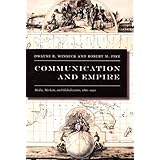
Average Reviews:

(More customer reviews)Although this substantial book is published in the "American Encounters" series of Duke University Press, it is in fact a detailed and almost global account of the role of electronic communications (telegraph, cable, and radio-telegraph) between 1860 and 1930; and of the power of the private companies which ran these communications. It shows that there is nothing new under the sun in international corporate activities: western corporations engaging in cartels, price fixing and exploitation in such regions as Latin America and China. Then, too, just as we talk about "universal access" to the Internet, there were many reformers who sought to regulate communication prices and make telegraph and cable accessible to the average person. (Many of these individuals were, incidentally, Canadians.) Thus "Communication and Empire" strikes a major chord for the contemporary reader.
The book is not an easy read -- lots of detail -- but well worth the effort for social scientists and communication scholars. Do not ignore the footnotes which often explain the social and economic impact of technological advances in electronic communications -- something which some of the reviews of this book, which I have read, seem to have ignored. I highly recommend it, and should note that the paperback edition is reasonably priced, especially considering the quality of the print and illustrations. Stephen Harold Riggins.
Click Here to see more reviews about: Communication and Empire: Media, Markets, and Globalization, 1860–1930 (American Encounters/Global Interactions)
Filling in a key chapter in communications history, Dwayne R. Winseck and Robert M. Pike offer an in-depth examination of the rise of the "global media" between 1860 and 1930. They analyze the connections between the development of a global communication infrastructure, the creation of national telegraph and wireless systems, and news agencies and the content they provided. Conventional histories suggest that the growth of global communications correlated with imperial expansion: an increasing number of cables were laid as colonial powers competed for control of resources. Winseck and Pike argue that the role of the imperial contest, while significant, has been exaggerated. They emphasize how much of the global media system was in place before the high tide of imperialism in the early twentieth century, and they point to other factors that drove the proliferation of global media links, including economic booms and busts, initial steps toward multilateralism and international law, and the formation of corporate cartels.Drawing on extensive research in corporate and government archives, Winseck and Pike illuminate the actions of companies and cartels during the late nineteenth century and early twentieth, in many different parts of the globe, including Africa, Asia, and Central and South America as well as Europe and North America. The complex history they relate shows how cable companies exploited or transcended national policies in the creation of the global cable network, how private corporations and government agencies interacted, and how individual reformers fought to eliminate cartels and harmonize the regulation of world communications. In Communication and Empire, the multinational conglomerates, regulations, and the politics of imperialism and anti-imperialism as well as the cries for reform of the late nineteenth century and early twentieth emerge as the obvious forerunners of today's global media.

0 comments:
Post a Comment